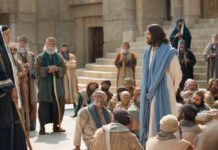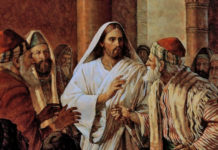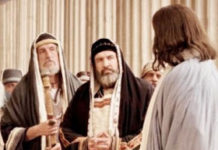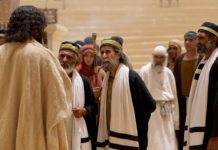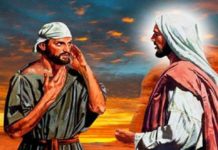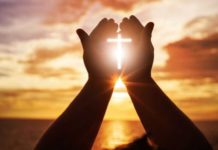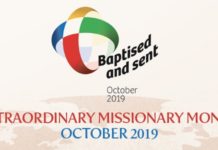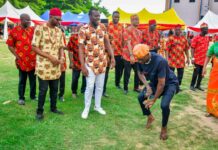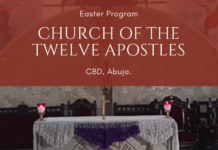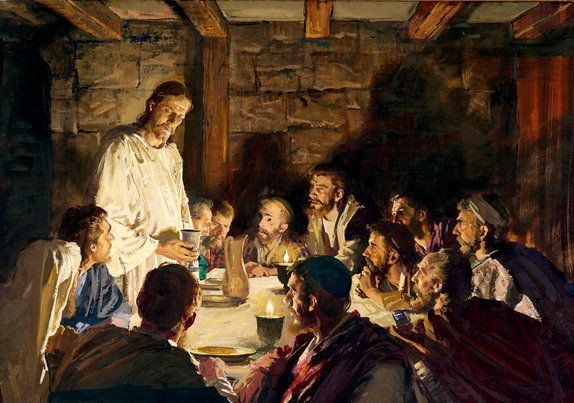Theme of the Sunday: Take and Eat! The three readings today help us to reflect on the meaning of the Eucharist. The first speaks of manna, an unexpected gift of God, that gave life to the people of Israel during their stay in the desert. The gospel presents a gift immensely superior to manna, it is the bread that gives eternal life. To eat such bread means to want to be identified with Christ. The second reading tells us that the Eucharist is not bread to be eaten alone. It is broken and shared as a means and sign of unity.
Entrance Antiphon
He fed them with the finest wheat, and satisfied them with honey from the rock.
Collect
O God, who in this wonderful Sacrament have left us a memorial of your Passion, grant us, we pray, so to revere the sacred mysteries of your Body and Blood that we may always experience in ourselves the fruits of your redemption. Who live and reign with God the Father in the unity of the Holy Spirit, one God, forever and ever.
FIRST READING
“He fed you with manna, which you did not know, nor did your fathers
A reading from the Book of Deuteronomy (Deuteronomy 8:2-3.14b-16a)
Moses spoke to the people, saying, “You shall remember all the way which the Lord your God has led you these forty years in the wilderness, that he might humble you, testing you to know what was in your heart, whether you would keep his commandments, or not. And he humbled you and let you hunger and fed you with manna, which you did not know, nor did your fathers know; that he might make you know that man does not live by bread alone, but that man lives by everything that proceeds out of the mouth of the Lord. “And you shall remember the Lord your God, who brought you out of the land of Egypt, out of the house of bondage, who led you through the great and terrible wilderness, with its fiery serpents and scorpions and thirsty ground where there was no water, who brought you water out of the flinty rock, who fed you in the wilderness with manna which your fathers did not know.”
The word of the Lord.
RESPONSORIAL PSALM Psalm 147: 12-13.14- I 5.19-20 (R. 12a)
R/. O Jerusalem, glorify the Lord!
O Jerusalem, glorify the Lord!
O Sion, praise your God!
He has strengthened the bars of your gates;
he has blessed your children within you. R.
He established peace on your borders;
he gives you your fill of finest wheat.
He sends out his word to the earth,
and swiftly runs his command. R.
He reveals his word to Jacob;
to Israel, his decrees and judgements.
He has not dealt thus with other nations;
he has not taught them his judgements. R.
SECOND READING
“Because there is one bread, we who are many are one body.”
A reading from the first Letter of Saint Paul to the Corinthians (1 Corinthians 10: 16- 17)
Brethren: The cup of blessing which we bless, is it not a participation in the blood of Christ? The bread which we break, is it not a participation in the body of Christ? Because there is one bread, we who are many are one body, for we all partake of the one bread.
The word of the Lord
SEQUENCE
Zion, praise your Saviour.
Praise your leader and shepherd in hymns and canticles.
Praise him as much as you can, for he is beyond all praising
and you will never be able to praise him as he merits.
But today a theme worthy of particular praise
is put before us — the living and life- giving bread
that, without any doubt,
was given to the Twelve at table during the holy supper.
Therefore let our praise be full and resounding
and our soul’s rejoicing full of delight and beauty,
for this is the festival day
to commemorate the first institution of this table.
At this table of the new King,
the new law’s new Pasch puts an end to the old Pasch.
The new displaces the old, reality the shadow and light the darkness.
Christ wanted what he did at the supper
to be repeated in his memory.
And so we, in accordance with his holy directions
consecrate bread and wine to be salvation’s Victim.
Christ’s followers know by faith that bread is changed into his flesh and wine into his blood.
Man cannot understand this, cannot perceive it;
but a lively faith affirms that the change,
which is outside the natural course of things, takes place.
Under the different species,
which are now signs only and not their own reality,
there lie hid wonderful realities. His body is our food, his blood our
And yet Christ remains entire under each species.
The communicant receives the complete Christ —
uncut, unbroken and undivided. Whether one receive or a thousand, the one receives as much as the thousand.
Nor is Christ diminished by being received.
The good and the wicked alike receive him,
but with the unlike destiny of life or death.
To the wicked it is death, but life to the good.
See how different is the result, though each receives the same.
Last of all, if the sacrament is broken, have no doubt.
Remember there is as much in a fragment
as in an unbroken host.
There is no division of the reality, but only a breaking of the sign; nor does the breaking diminish the condition or size
of the One hidden under the sign.
Behold, the bread of angels is become the pilgrim’s food; truly it is bread for the sons, and is not to be cast to dogs.
It was prefigured in type
when Isaac was brought as an offering, when a lamb was appointed for the Pasch
and when manna was given to the Jews of old.
Jesus, good shepherd and true bread, have mercy on us; feed us and guard us. Grant that we find happiness in the land of the living.
You know all things, can do all things, and feed us here on earth.
Make us your guests in heaven,
co-heirs with you and companions of heaven’s citizens.
Amen. Alleluia
ALLELUIA John 6:51
Alleluia. I am the living bread which came down from heaven, says the Lord; if any one eats this bread he will live for ever. Alleluia.
GOSPEL
“My flesh is food indeed, and my blood is drink indeed.”
A reading from the holy Gospel according to John (John 6 :51-58)
At that time: Jesus said to the crowds of the Jews, “I am the living bread which came down from heaven; if any one eats of this bread, he will live for ever; and the bread which I shall give for the life of the world is my flesh.” The Jews then disputed among themselves, saying, “How can this man give us his flesh to eat?” So Jesus said to them, “Truly, truly, I say to you, unless you eat the flesh of the Son of man and drink his blood, you have no life in you; he who eats my flesh and drinks my blood has eternal life, and I will raise him up at the last day. For my flesh is food indeed, and my blood is drink indeed. He who eats my flesh and drinks my blood abides in me, and I in him. As the living Father sent me, and I live because of the Father, so he who eats me will live because of me. This is the bread which came down from heaven, not such as the fathers ate and died; he who eats this bread will live for ever.”
The Gospel of the Lord.
Today’s Reflection
In spite of the presence of numerous varieties of food that tickle our taste buds, they cannot satisfy our hunger forever and give us eternal life. Only Jesus Christ, our food and drink, can satisfy our hunger and quench our thirst forever. Blessed Alexandrina Maria da Costa of Balasar, Portugal, fed on the Eucharist alone for more than thirteen years! But today the Eucharist, for many, is a lifeless piece of bread. Several Catholics around the world disbelieve in the real presence of Jesus in the Eucharist. The Devil dreads the presence of the Eucharist and we who claim to be believers and followers of Jesus end up desecrating the Eucharist by our sinful way of life.
John Ronald Reuel Tolkien, an English writer and university professor wrote, “Out of the darkness of my life, so much frustrated, I put before you the one great thing to love on earth: the Blessed Sacrament… there you will find romance, glory, honour, fidelity, and the true way of all you loves on earth…. The only cure for sagging or fainting faith is communion. Though always itself, perfect and complete and inviolate, the Blessed Sacrament does not operate completely and once for all in any of us. Like the act of faith it must be continuous and grow by exercise. Frequency is of the highest effect. Seven times a week is more than seven times at intervals”.
